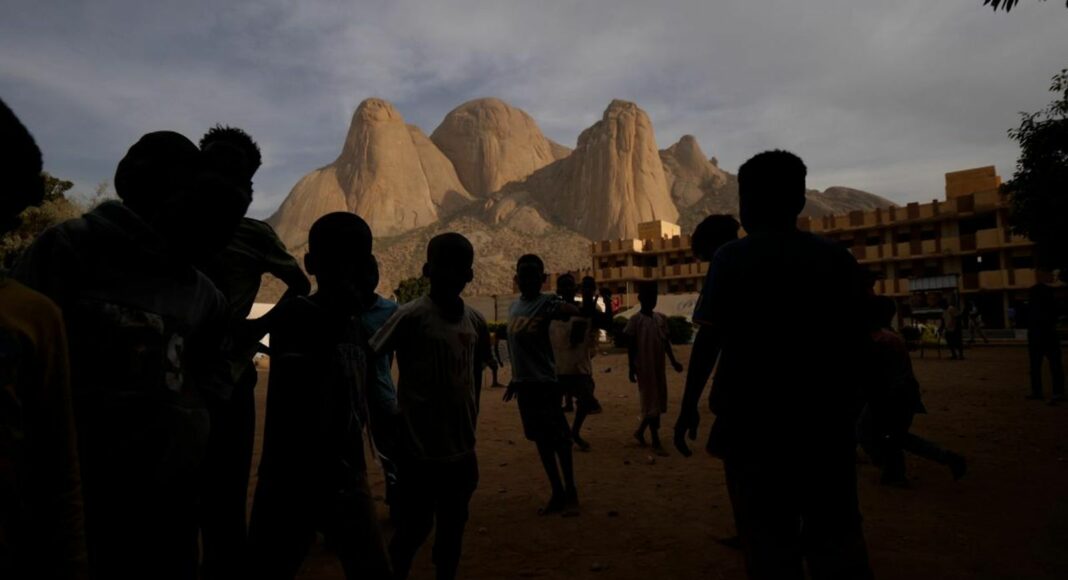The road to Kassala is infamously hard to traverse. It has seen little maintenance over the years and during these times of war, it is ungovernable.
Trenches cut across the tarmac from one stretch of mountainous desert to another. The hoods of SUVs disappear into them and send passengers flying out of their seats as the cars buck in and out of the ridges.
For the healthy traveller, the journey is a source of pain and discomfort. For those suffering from illness and living with disabilities, it can be lethal.
Sudan’s humanitarian crisis explained
This difficult trek was endured by hundreds of vulnerable disabled civilians and orphaned children searching for some semblance of safety in Sudan’s eastern state.
One infant orphan died on the road and another died soon after arrival, their small sick bodies battered by the 24-hour passage and the violent conditions of their departure point.
But many more died in the besieged cities they narrowly escaped.
Image:
The al Maygoma orphans have been forced to flee not once, but twice
When war broke out in Sudan’s capital Khartoum between the Sudanese Armed Forces (SAF) and the paramilitary Rapid Support Forces (RSF), residents thought it would only last a few days.
The city emptied as weeks turned into months and civilians started dying from lack of food and water, on top of the ferocious armed violence.
In Khartoum’s well-known al Maygoma orphanage, 69 children died from illness resulting from the war-time conditions.
Like nearly half a million others, the orphans were evacuated almost four hours away to Wad Madani in a joint effort by the International Committee of the Red Cross (ICRC), UNICEF and government authorities.
The country’s second-largest city became a growing humanitarian hub and treatment centre for the sick, elderly and disabled.
Image:
This classroom has been converted into a bedroom for babies and toddlers
But on 18 December, the RSF captured Wad Madani and testimonies of terror, looting and murder echoed out of the former safe haven.
The hundreds of orphans, alongside adults and children with disabilities, had no choice but to embark on the arduous journey to Kassala.
When we met them, there was a sense of unease. A severe lack of life-saving supplies and uncertainty over their long-term safety.
Read more:Inside Sudan’s combat training camps for womenImages reveal mass graves haunting a once thriving capital
The al Maygoma orphans are now settled in a primary school at the foot of Kassala’s bulbous Toteel mountain.
A lower ground classroom smells of old urine and sickness as underweight babies and toddlers roll around straw mats on the hard floor.
A round steel tray arrives with foil-covered plates and more than two dozen small children gather around.
No beds for children
“Five of them have died since evacuation. One died on the way and one on arrival. They were both in need of surgery and were declared dead in the hospital,” says Dr Abeer Abdullah Zakaria, a medical caretaker at the orphanage.
“Three more of them have died at the orphanage since. They suffered from cerebral palsy and contracted blood poisoning from their bed sores.”
Aside from a few flimsy donated mattresses, the young children have no beds to lie on.
Image:
This school in Kassala is now a shelter for displaced people with disabilities
Outside the classrooms, more children from the care homes of al Hasahisa, a town near Wad Madani, sleep under tents on the hard playground.
Their delayed and tumultuous evacuation was a source of great controversy.
Organised by committed local volunteers several days after the first group was extracted, it was held up at Kassala’s state border for another 24 hours.
Despite their living conditions, these children play loudly and joyfully – a sign of relief and gratitude for their safety after the effort to bring them here.
But across town in a shelter for displaced people with disabilities, there is a longing for home.
‘Struggling in every way’
The parents tell us that they designed their houses around their children’s needs. Now, they are huddled in classrooms with strangers.
“You cannot even imagine having a child with severe autism and living in a displacement shelter and lacking basic necessities. They can’t just eat anything or stay in any room. They are struggling in every way,” says Nemat Hassabu Ali.
She fled her house in Bahri, Khartoum, with her two sons. Both have been diagnosed with severe autism and the sound of airstrikes and shelling was overwhelming for them.
She was hesitant to evacuate immediately over concerns that few would accept and accommodate her children.
They ended up leaving after running out of food.
Corpses littered the ground around their home as they escaped, she says. Her youngest son, Motaz, still obsessively draws the corpses he saw that day.
In Wad Madani, where they sought safety for weeks before the RSF advance, and now here in Kassala, her children continue to suffer in a crowded shelter that is far from their purpose-built home.
“We just hope that the war ends and we can go back to our home,” says Nemat with teary eyes.




